The Da Nangian Indifference: From Sunna to Sundown
I am a writer from Canada, living in Cam Ha, Vietnam with my cat Twang.
You can follow me on Instagram and Twitter

You must write quickly; the recollection of my trip to the Da Nang Buddhist Pagoda took place when I was happy—so happy, in fact, that I can write this next to a Chinese karaoke bar, watch the pool attendant skillfully fail to catch a gecko with a Coca Cola can tied to a broomstick, and enjoy it. This is a nice hotel. There are concierges who smile and ample room for my cat, Twang, to practice hunting my guitar case. There is a pool, which is implied by the attendant, though so many strange things happen in Vietnam that I would not presume the pool actually exists; the attendant might be here just in case. So, now I am happy, but at the time of my journey I was sad and so, I think, was Twang.
Dread had overcome me as soon as I landed in Da Nang, like the time I ordered food at a restaurant, only to watch the server take assertive, Vietnamese-business owner steps towards her open phone and YouTube. “She’s not going to play the instrumental version of Titanic,” I repeatedly lied to myself, before filling in the lyrics in my head, and closing my book on the table.
I had grown accustomed to the celebrity of living in a castaway suburb of sprawling Ho Chi Minh City, spending days without seeing another white person outside from my hotel. Answering “Ha-llo!” with “HAI!” and a peace sign and having no smile go unreturned had created a weak man, unprepared for the Da Nangian indifference. If I had known I was jumping into frigid waters (literally, as I went from sweltering 30+ degree days to overcast and 20), I might not have spent the $60 for the hour long plane ride. In Ho Chi Minh (Vietnam War veterans remember it as Saigon), I was not strange for smiling and, most importantly, not a single person had told me what to do. The citizens of Da Nang were colder; my theory is the city is much smaller—like New York to Santa Barbara—so although there was a smaller quantity of tourists, you saw us more. Saigon was a resentful marriage in a mansion; Da Nang was Charles Bukowski living in a studio apartment with Yoko Ono. Painfully, I became aware I was no longer special.
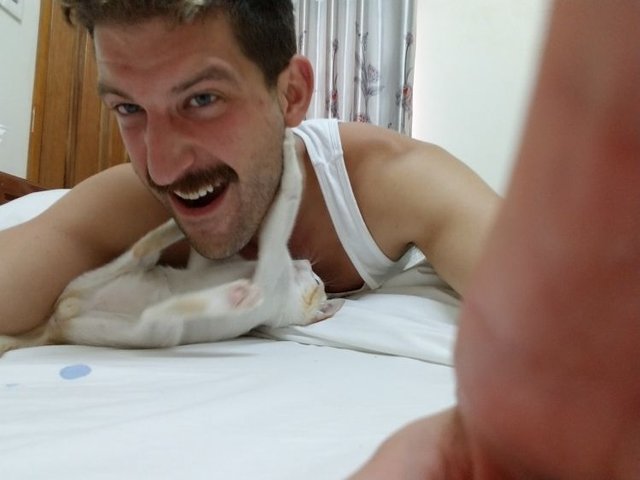
I was listening to rap music as we landed and, imbued with that and the confidence of a Western man-child, unencumbered by the scrutiny or regulations of his homeland (and yet to face the reckoning of his own decisions), I immediately left the terminal to smoke a cigarette. Outside, I saw the shuttle driver, who had been waiting 40 minutes for the delayed flight.
“I’ll be right back,” I said. “Cigarette, then grab luggage.”
The HCMC airport, Tan Son Nhat, had reminded me of LAX. Now, I was smoking in a tropical imitation of Saskatoon’s John G. Diefenbaker International. I tossed the dart and headed back inside, only to have my headphones removed by a policeman who reduced my gale of confidence to a light breeze and made me walk around the building to a security checkpoint used only by the airport staff and idiots.
I told the Vietnamese Amazon manning the scanner that I needed my luggage. She shook her head at me until I showed her the Google Translation for “luggage”, but maybe it came out as “I have a small penis”, as she responded by throwing her head back and laughing like a drunken Scottish warlord. I demonstrated my anger like a eunuch, pacing back and forth while my cup filled with anxiety for the waiting driver, my guitar, and my underpants—the latter for which I was most concerned.
When she lugubriously arrived with my luggage (putting on a big show about how heavy it was—not so tough now!), so did a group of baggage handlers, pilots, cart drivers, and fast food employees—all going the opposite way—and to whom the Amazon showed almost deferential politeness. They had all been blessed with the great gift of comedic timing: she’d pump-fake as if putting my bag through, then withdraw it as someone new ambled through the door. Then a pilot would show up, walk through with a bag of loose metal, laugh uproariously, and put them through one at a time, in individual bins.
My original hotel, Papa Mike Hostel, in which I’d obviously booked a private room, was fantastic. I met my friend Adam in town that night for a serious tete-a-tete involving Larue beer, and returned at midnight to find that a grate had been pulled over the door for security purposes. My scale of the alley wall was successful, but my only reward was to watch my hat fall into the kitchen, while I hung half-in and half-out of the tiny window. My unfaithful hat had tried to cozy up with the grate-keeper, waking him up in the process. As the grate rose, he pointed to a startling large button on the wall, obviously meant for latecomers.
“Button,” he said.
I awoke at noon to an anxious rapping and opened the door to find the concierge, Minh, and the manager, Mei, with a huge plate of dragon fruit, mandarin oranges, and a Korean pear the size of a Canadian watermelon.
“You missed breakfast, so we brought it to you,” they said, but my Google Translate had been left on: “We thought you were dead, and we wanted to make sure you weren’t.”
The smiling faces of Mei and Minh and eventually Papa Mike himself (plus the fact they allowed me to read and keep their copy of Black Beauty) made it less a sunny winter day and more a July snowfall in Calgary for a snowboarder. But I quickly returned to a malaise, like a Charles Dickens orphan tasting a plum before returning to the orphanage for gruel enemas.
At Papa Mike’s, I had not yet acquired my cat but, after doing so, I was determined to find us a permanent home and alleviate the grueling cycle of hotel hopping.
What I got was a long-term stay at the Sunna Hotel, where I was given more welcome from the clerk’s dangling cigarette than from the man himself, who glared suspiciously at me from behind the counter. Behind him was a wall of clocks, ticking the time for various fashionable places, like Tokyo and London. After a day at the Sunna, I decided the clocks were an unnecessary expense as I don’t think any patron of this hotel had ever cared for the time somewhere fashionable.
My room was big enough for a bulimic to turn around in, or to maybe play The Mary Ellen Carter, had I been keen on re-enacting the sinking of the titular ship with my guitar rather than learning the chords. If I had died at the Sunna, as opposed to say, Papa Mike’s, I don’t think the staff would have cleaned the room after dropping my corpse onto the unfinished hotel below. It’s highly possible the workers below—cutting sheet metal in sandals and, at times, screaming —had missed the thud of falling bodies before, as the techno music they played from 6AM to sundown prohibited anything but conversational yelling.
The fulfillment of the Da Nang Dread Prophecy I had encountered in the airport had infected me with a creative lethargy that, now loose, had morphed into Jane Fonda siren-calling me down an overgrown jungle road, only to be butchered by such Vietcong thoughts as, “If I’m not happy on vacation, when will I ever be?”
The car horns were personal in Da Nang. Walking, which had been a relaxing exercise, now became like the repetition of a difficult scene for a drama class, which entails a cab driver leaning on his horn for three seconds and shouting, “HEY! YOU WANT TAXI!?” to let you know it’s time to say “NO! GODDAMN IT!”
I’m not well versed in seafaring terms, though I correctly guessed and confirmed with Google Maps that Da Nang was situated on a bay. Imagine the Dreamworks logo—the one with the moon and the fishing boy—and flip it on its vertical axis. That is Da Nang: the boy is a bluff jutting into the sea, with Da Nang below it, and North-West, on the moon’s upper crescent, stands the towering, bone-white Lady Buddha, looking over the bay and emitting her beacon: “Cab here, take the tour bus, cab here, take the tour bus.”
I wanted to give Da Nang a chance to redeem itself. The opportunity to save my eternal soul by meeting Lady Buddha was a bonus. Norm MacDonald once visited a psychiatrist, who told him he gambled to escape the reality of life.
“Isn’t that why we do anything?” Norm asked.
The doctor stared into the distance, like he was recalling a bad gassing at Vimy Ridge.
“You’re not supposed to be able to stump a psychiatrist,” said Norm.
Lady Buddha was to be my escape, my distraction—like the jingly bells and shoe strings I brought home for Twang. Going bust would, at the least, have gotten me out of the hotel room. I ignored her plea to cab because fortune favours those who work hard and I’ve always thought it would be distasteful to take a taxi to Nirvana; also, it was a rare sunny day and I wanted to tan my upper thighs.

I packed a bottled water, one of the protein bars my mother had managed to cram into my book-laden backpack (on the floor of YVR airport an hour before my flight), and an unread (by me) Bible I had purchased for five dollars in Toronto at a used book shop exactly a year ago. The front cover is inscribed with: “Something, something, something… 1939”. It was written at a time when people practiced good penmanship, so it is completely illegible to me.
“What better time to read the Bible than at a sanctuary for the Buddhist faith?” I thought, much like a guy who wears a Michael Vick Falcon jersey to an NBA game.
So along came the Bible, and I strode towards the Sweet Lady, no longer with the airport confidence of a Western Milk-Drinker, but that of a man confident that a lady could save him—a feeling I was well-accustomed to.
Like my father, I pride both the duration and the speed of my walking tremendously, and back it up with my phone’s step counter, which verifies I am in the top 1% of walkers for my age group (who own a Samsung Galaxy Note 8). Determined to continue my legacy, the strip mall of Da Nang quickly faded to a jungle-lined highway easy to imagine olive green army trucks careening down. Instead, there were motorcycles and busses packed with Chinese tour-groups that skidded the shoulder at every blind turn. Getting up the winding highway in haste could be a matter of life and death, but at least I would die in the 1% and not become part of a hotel basement. Insidious challenges lay before me: the throbbing sun, the incline, and Larue-drinking Vietnamese, peeking out of jungle pho shops to stare because I was dressed like a sluttier Richard Simmons.
Buddha had seen it fit to ease my sorrow by filling the road to salvation with distractions, or maybe it was a way to deter all but the most single-minded. I wanted to jump in the lake, take pictures of the cows in both the jungle and on the highway, and drink beers with people sitting in plastic chairs. Aside from taking pictures of the cows, I passed the gauntlet, shirtless, backpack on my chest and shorts rolled up to maximize the available tanning area.
(As I write this beside the pool in Hoi An, there is the presence of something at my feet. “A cat or a rat.” It doesn’t matter anymore, and I wouldn’t hazard $5 on which are bigger. Between Saigon and Da Nang, the Saigon rats are clearly the bigger, but both species more closely resemble the swamp creatures from the Princess Bride than the Granville Street rodents I am familiar with.)
I was eager for the incline that my phone later told me was about 170 metres. Da Nang actually has mountains, where Saigon had seemed a prairie—a Vegas filled with pho and less aggressive pimps. I needed energy to maintain my pace, and thus played a bluegrass/country singer I had recently found on Spotify. His name is Jimmy Murphy and I was very disturbed to find him so obscure; his top song only had 9,000 plays and pondering this for the past week may have contributed to my malaise. It was a constant reminder each time I held my guitar that when I write the perfect country song, it will get less YouTube views than someone eating a dog turd, while I languish in the Sunna Hotel forever, cycling through cigarettes, my eyes following flies like Michael Sheen in Apocalypse Now.
YouTube views aren’t the reason you try to write the perfect country song though. Jimmy Murphy’s is pretty damn close—a track called “Electricity”. The chorus was extremely relevant for my pilgrimage:
"You can’t see electricity or movement down the line,
but how in the world can you doubt it, when you can see it shine?
When you get salvation, the current you can feel,
you won’t have to have nobody, to tell you that it’s real."
My favourite part of the song—other than his disinterest in the opinions of educated people—is his pronunciation of “elec-a-tricity”. Listen to it, please.
Distracting myself with bluegrass, quick strides, and cows was working, and I had creative thoughts flowing off me like I was a river going up the mountain. When Norm MacDonald was screaming at the quarterback for losing him a million bucks, I bet he forgot a lot of troubles, including that he had just lost a million. That’s expensive therapy—walking to a pagoda is free and I didn’t have to include “losing a million dollars” under “staying at the Sunna Hotel”.
In the sun-hazed distance there stood one more distraction—a couple walking the same highway shoulder as me, two people who I certainly didn’t think should be ahead of me in a race (which that moment declared it to be). Perhaps this was because of my natural bent for competition or a trait imparted on me from the Grouse Grind, a gruelling, uphill hike in Vancouver on which I would mentally repeat, “Why is that guy in front of me?” until I was sitting under the gondola, basking in the religious ecstasy only achieved from incredibly intense cardiovascular exercise and really shaky legs on the edge of a big cliff.

I surpassed them with ease and found the entrance to the pagoda all by myself without the use of the tourist panacea, Google Maps. A steep staircase led to heaven, like something from Indiana Jones and the Temple of Doom. Despite my fatigue, I ascended them with the quickness of a spider monkey, or premature ejaculator, and was soon bushwhacking through unadulterated jungle.

I barged through several metres of jungle before realizing I was wrong, and that I am only more scared of sharks than of spiders. I turned back to see the couple ascending the same steps as I. Perhaps my teenage Messiah Complex had been real, afterall.
I waved to them—“Go back, it’s a dead end”—and the man stared dumbly at me, like a billy goat.
I inquired how their walk was and where they were from.
“Ja, good. Austria.”
Languishing in Vancouver, wondering why no one liked me, I read an article about a guy whose car would constantly break down, but no one would stop to help him on the side of the road. When he gave up and started pushing, cars would immediately pullover to join him. I was happy this had now been anecdotally proven in my life, and laughed, thinking that the Austrians—from a country that had willingly annexed itself to Hitler with 99% of the vote—should be a little more wary of following a man with a mustache.

“Is this the vay to da Pagoda?” he asked.
“No,” I said for the second time, wondering if it had been the first.
“Oh,” he replied, without friendliness.
“This!! Eeess!! Naht!! The Vay!!! To!!! The!!! Pagoda!!!” I refrained from saying, wishing I had a lectern to bang, and imagining how nice it would be for the Austrians to carry me on their shoulders the rest of the way.
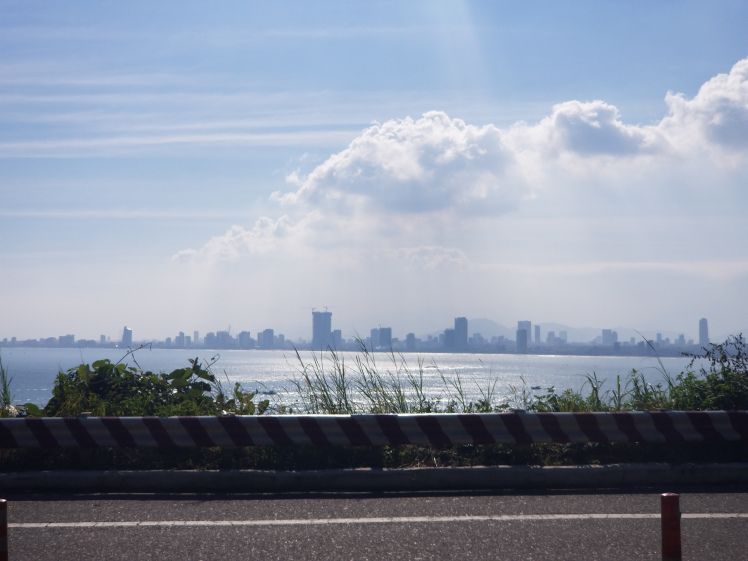
I stage-exited the Austrians to find the Google Maps-verified pagoda entrance. The ancient fishing boats bouncing on the waves were mesmerizing, as was Da Nang when I wasn’t in it. Then the Vietnamese security guard yelled at me, which took no translation to understand: “Put on some pants!”
As I was doing so, the male Austrian ran to me breathlessly, asking if he needed “trousers”, and I started to say yes.
“If the security guard asks you, put on some fucking pants, man. Jesus Christ. Go ask him.”
This is what has befallen the descendants of the mighty Austro-Hungarian Empire? I went travelling to Vietnam with a bag full of books and three pairs of underwear and I had the good, goddamn sense to bring some pants and a long sleeve shirt to the Buddhist Temple.
I lasted fifteen seconds in the main Pagoda before the ennui of being in a Pagoda set in, but felt obligated to light an incense candle to celebrate my journey and because some hippy-dippy ex-girlfriend had firmly believed it exorcised bad spirits. I approached the monk who had them, stacked high, next to a donation box. I put in 10,000 dong—around 30 cents—then met a reproachful stare that made me sift through my wallet and shove in dong after dong. When I felt I was safe, I grabbed my incense, lit it, and ran to the gift shop.
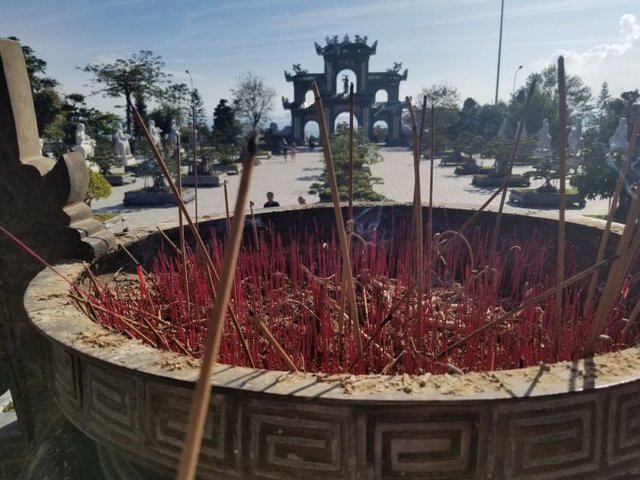

Gift shops are the home of crap and so it was no surprise that one on the pinnacle of a mountain seemed to have taken all the overstock from the ones beneath it. This did not dissuade the flocks of tourists from ogling mass-produced fake ivory elephants and jade Nike swooshes. I purchased a bead bracelet and wondered if this signified a new chapter in my life, one where I rode around on long boards, nurtured dreadlocks, and returned home to begin conversations with “In Viet Nam…”
After wearing the bead bracelet and finding it an impediment to the most simple things, like resting my hand on a table, I realized this would not be the case. Also, there’s only so much time you can spend in a pagoda, and I was sure I had spent the maximum.
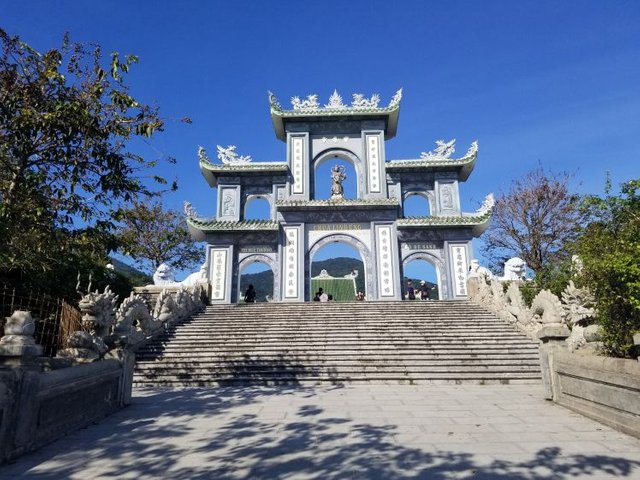
There were still a variety of statues and gardens that, while beautiful, reminded me of my mother’s much better garden and were filled with people taking selfies, which did not remind me of my mother’s garden. The uncollared pagoda dogs were the highlight and the best of them looked like the bastard son of a haughty, lead Husky and some paperless dog-whore from Saigon. He had no taste for a comb and no eyeballs—I hope this increased his other senses because a sunlit pagoda was a perfect place for him to sunbathe.
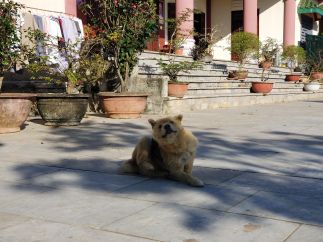
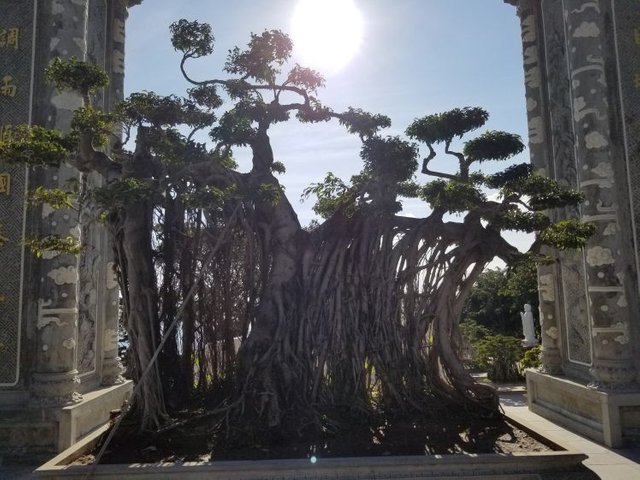
I retired to an abandoned section of the grounds to read my Bible, since I found the Buddhist Temple™ to be lacking salvation. This feeling of religious was verified days later when Adam Jang, the frontman for the rock band YETI, called me.
“Mac, I need you to play the cajon for our show tonight.”
“What is the cajon?”
“It’s a box that you sit on and hit, instead of the drums.”
“How much do I get paid?”
On the Uber ride to Soul Kitchen, we counted seven Buddhist Temple Supply Stores, the sidewalks lined with carvings identical to every statue in the pagoda, like if someone brought Medusa to the Star Wars premiere at Grauman’s Chinese Theatre. Lady Buddha would be impressive were it only her on Earth—not when she’s a cheap, mass-produced harlot.
My church attendance hymen had been broken at the funeral of my friend BJ when I was 18 and I had held the hymn book upside down, which is strange, since it’s written in English. In Vancouver, I attended church on Sunday’s to shake things up, much like the journey today. The singing and hymns were too pagan for me—the priest’s homily was my favourite. When else would I spend thirty minutes pondering the meaning of loyalty, or how I could advance it in my own life? Most Vancouverites find it hard to ponder at all. The common cultural practice on a Sunday in Vancouver is to wake up at 2PM crying “agua” like the survivor of the desert massacre in “No Country for Old Men.”
I once made the mistake of informing someone I was heading to church and was struck by how curious our society was; in Vancouver, a churchgoer is someone you flee like a gas leak, but a casual drug user is someone you invite into your house. If you say you practice Reiki, or put healing crystals in your vagina, some people actually listen.
I sat in the sun and flipped through pages in the Bible, hoping—by divine miracle—for the book to open itself to the verse I was looking for: 1 Corinthians 13:11. It took a good deal of page flipping. I wanted this passage because Mrs. Mulder, my favourite teacher in high school, had read it to us in a very straight-backed, Victorian manner, which I strongly approved of. She was the kind of lady you’d hope to answer the door of some country mansion when you were lost on a rain-drenched English road; a lady who would invite you in for a cup of tea while admonishing you for being so foolhardy.
She taught me the most valuable lesson of my life—in History class, the first time she taught me. Since my childhood was spent reading King Arthur and attacking my sisters with plastic swords, I averaged 103% in the class. At age 15, I knew the vocabulary word “caltrop” without studying and even drew it beside my definition for extra emphasis. Then she gave us the castle assignment. It was simple. We just had to draw a goddamn castle, and I spent hours drawing and redrawing a castle of the most impressive genericism to impress her. I thought that it, and by extension, writing, was about who had the straightest lines.
1 Corinthians 13:11
When I was a child, I spake as a child, I understood as a child, I thought as a child: but when I became a man, I put away childish things.
For now we see through a glass, darkly; but then face to face: now I know in part; but then shall I know even as also I am known.
Public weeping is one of my favourite pastimes in Vietnam, so the emotional outpouring after reading this was no medal ceremony. I sobbed reading Black Beauty outside Papa Mike’s, and let silent tears slip down my cheeks at a café over Wilde’s The Happy Prince. Having the tallest man in your vicinity break down in tears is off-putting and distressing to the Vietnamese. How would you feel seeing Andre the Giant in the fetal position?
“Something terrible has occurred, but what? And how much will it affect me?”
In my emotional state, the blind dog reminded me of Gideon, our adopted Irish Setter who had just gone to the Dog Pagoda in the sky. Gideon had reminded me of a reflection I had on adopted dogs pleasing their new owners with tricks their old ones taught them, and how humans do this too, with lovers. (My most practiced trick is tying the tea bag around the stem of a mug before pouring in the hot water—I feel disingenuous to do it with a new lady, but it’s so goddamn useful.) This thought, synthesized with the Bible verse and Mrs. Mulder, produced actual sobbing.
See, Twang is a chirper whenever I come home, or write, or play guitar without him. The only thing that quiets Twang is being with him, or letting him lie on the small of my back and purr. I never have visited Mrs. Mulder because of my childish notion that I needed to bring her something substantial I had done to impress her with. Like the castle assignment, I had failed terribly. Now, I don’t think Mrs. Mulder could fit in the small of my back, nor do I think she would want to try, but the least I could have done is visited her to thank her for her impact.
The tears pouring down my cheeks attracted the Chinese tourists like flies, who were no longer taking selfies, but pictures of Andre the Giant in a fetal position. After several attempts, I found the exit to the Pagoda and left quickly—aside from an encore performance for the security guard, for whom I transformed back into Richard Simmons. The bluegrass and the pagoda and the Buddha and the infantile sobbing had been “the current [I] could feel” and I walked down the highway, past the same busses and the same drunks and the same lake but unfortunately, not the cows. I would not eat until Da Nang.
There is a species of cat smaller than the average housecat. It is native to Africa and it is the Black-footed cat (Felis nigripes). Its top weight is 5.5 pounds.
Fossil records from two million years ago show evidence of jaguars.
I'd like to unsubscribe from Cat Facts.
The ancestor of all domestic cats is the African Wild Cat which still exists today.
Good post sir.. thank you so much..
Florence Nightingale owned more than 60 cats in her lifetime.